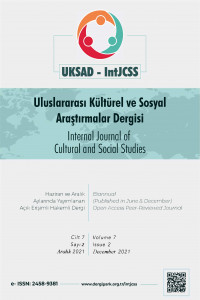Review
Research Article
Aim & Scope
IntJCSS (e-ISSN: 2548-9381) is an International Refereed Scientific Journal published biannually (in June & December) and operates on Open Access conditions using Turkish National Journal Publication Platform, Dergipark.
We are glad to invite you all to submit your educational researches in our new journal, International Journal of Contemporary Educational Studies (IntJCSS). As having a very ambitious team of academic staff, we really believe that this journal would attract intention from serious scholars working on different dimensions of cultural, social, and educational sciences.
We invite you to submit your high-quality research and review articles on cultural and social studies. We also promote all the researchers to use our articles in their researches and contribute to the development of our journal through their citations.
IntJCSS is indexed and listed in Index Copernicus (ICV=80,15), J Gate, Google Scholar, Research Bible, SOBIAD, Turkish Education Index, Scientific Indexing Services, Open Access Library (Oalib), Idealonline and was also submitted to many international indexing services for revision.
Author Guidelines
1) Journal Information: International Journal of Cultural and Social Studies is published biannually, in June and December. Apart from the ordinary issues, special issues on special topics or on conference proceedings are also planned to be published in certain periods.
The journal is officially abbreviated as IntJCSS. It is an open access online journal, available as full text and open for anyone. The journal operates totally FREE OF CHARGE for both authors and readers.
IntJCSS is a peer-reviewed journal, and each manuscript needs to be reviewed by at least two separate reviewers on a blind review basis. IntJCSS never asks authors to recommend reviewers for their own submissions. Those who are interested in reviewing articles should contact the manager of the journal.
IntJCSS has two working languages; English and Turkish. The manuscripts written in Turkish must necessarily include an abstract in English.
2) Scope: IntJCSS is primarily focused on cultural studies, both theoretical and practical, but also is willing to explore and contribute to the field of social sciences in general. All the related social sciences, such as; sociology, psychology, history, communication, theology, management, literature, linguistics, arts, sports sciences, etc.are planned to be covered.
The journal welcomes to receive submissions of reviews, original researches, case studies, letters to authors, and book/article criticisms on related topics.
3) Copyright & Responsibility: Submitting a manuscript to this journal means that the author(s) agree;
- that this manuscript has not been published or sent for publication elsewhere;
- they have responsibility of the contents and authenticity of the article;
- the journal and author(s) have the same right for the copyright of the article and either of the journal or author(s) can use it by any way without noting the other party.
- author (s) should clearly explain any contributions received from other parties, any financial support received either from individuals and/or institutions, and also any kinds of conflict of interest.
- author(s) should add an explanatory footnote to the title if the manuscript was presented in a conference or reproduced from a dissertation.
4) Originality: Submitting your manuscript to our journal, we understand that this is an original manuscript and is unpublished work and is not under consideration elsewhere. Plagiarism, including duplicate publication of the author’s own work, in whole or in part without proper citation is not tolerated by the journal. Manuscripts submitted to the journal may be checked for originality using anti-plagiarism software.
5) Open Access Policy: The journal is based on open access policy. All the articles published in this journal can be reached free of charge any time through a regular internet connection. Therefore, all our articles have free availability on the public internet, permitting any users to read, download, distribute, copy, share, print, search, on link to the full text of these articles, crawl them for indexing by any of the indexes and databases, or use them for any kinds of legal purpose without any financial, legal, or technical restrictions. For the full details of this policy please refer to Budapest Open Access Initiative.
6) Publication Fee: There is NO FEE to publish articles in this journal. We don't ask for any charges under the name of article submission or processing cost.
7) Manuscript Preparation & Submission
Please remove your name and institutional information from the article when uploading. Load the article in accordance with the journal's writing rules.
Each manuscript is suggested to include the following components, but not necessarily to follow it exactly;
(1) Title: including the complete article title; each author’s full name; institution(s) with which each author is affiliated, with a city, and country; and the name, complete postal address, telephone number, and at least one email address for author(s). IT IS NECESSARY to have EACH AUTHOR's affiliation and contact, at least valid email address.
(2) Abstract (not less than 100 words and more than 250 words; including short sentences about Background, Materials and Methods, Results, and Discussions)
(3) Keywords (not less than 3 words and more than 8 words)
(4) Introduction
(5) Materials and Methods
(6) Findings / Results
(7) Discussions / Conclusions
(8) Acknowledgments (if applicable - And if there is a funding resource, it has UTMOST importance to explain it in this part!))
(9) References
Manuscript length for a research paper should be 4 to 20 pages.
Manuscript Submission
Authors should follow the explanations on the web site in order to submit their articles.
Manuscript Template
Manuscripts should be prepared with The Microsoft Word file; Font: Normal, Times New Roman, 12 pt, single space; Indent: No indents; Page Setup: Paper-Letter size; Margins-2.5 cm each side; Title: Use Title Case in the title and subtitles (e.g. “The Relationship between Multiple Intelligence and Academic Motivation”); Figures and Tables: Use full word of figure and table (e.g. Figure 1. Relationship Diagram between MI and AM, Table 1.Annual Income of Target Groups)
References (APA style): Cite references in the text as “last name, year”, e.g. (Kırık, 2013: 67 ). For multiple authors and page numbers in the text, e.g. (Turkmen et al., 2013: 65).
References should be listed in alphabetical order, and include all the authors’ last names and initials (no dots after initials), title, journal, year, volume, issue, and pages etc.
Reference Examples:
Gardner, H., Kul, M., Taner, B., Ozkan, A. (2012). Multiple intelligences: the theory in practice. New York: Basic Books.
Stanford, P. (2003). Multiple intelligence for every classroom. Journal of Education Psychology, 39(2): 81-89, http://www.makalearsivi/tarih.ornnek.html (14 Mayıs 2016 tarihinde erişim sağlanmıştır).
Turkmen, M. (2004). The effects of martial arts on children development. International Journal of Contemporary Educational Studies (IntJCES), 8(1): 276-281.
Ethical Principles and Publication Policy
Our publication and ethics policies will be updated soon.
Indexes
Citation Indexes
Other Indexes
Journal Boards
Baş Editör

Editör Yardımcıları Kurulu




He was born in 1996. He completed his bachelor’s degree in Marmara University, Faculty of Communication with double major programme with “Journalism” and “Radio, Television and Cinema” programmes. In the spring semester of 2018, he studied in France as an exchange student of Erasmus exchange programme. In 2017, he made his short feature documentary “Abandoned Seats” and in 2020 he worked as producer, co-writer and 1st assistant director in a short feature film titled “Best Actress”. With his works, he was selected and awarded by many film festivals, both nationwide and international. He is still a student of master’s in the field of Cinema in Marmara University.
Mimar Sinan Fine Arts University, Faculty of Communication, Department of Digital Game Design


Yayın Kurulu


1969’da İzmir’de doğan Fatih Toktaş, 1991’de Dokuz Eylül Üniversitesi İlahiyat Fakültesini bitirdi. 1996’da Prof. Dr. Mehmet Dağ danışmanlığında “Farabi’nin Eylemsel Felsefesinde Ahlak ve Siyaset İlişkisi” başlıklı teziyle yüksek lisansını tamamladı. 2001’de Prof. Dr. Mahmut Kaya danışmanlığında “Meşşâî Felsefeye Yöneltilen Eleştiriler” adlı teziyle de doktorasını yaptı. 1993-1994 akademik yılında Milli Eğitim Bakanlığı bursuyla Mısır’da yedi ay İslam Felsefesi ile ilgili çalışmalar yaptı. 18.06.1992 tarihinde Ondokuz Mayıs Üniversitesi İlahiyat Fakültesinde İslam Felsefesi Tarihi Anabilim dalında başladığı araştırma görevliliğini, 18.07.2005 tarihine kadar sürdürdü. Bu süreçte, Felsefe ve Din Bilimleri Bölüm dersleri arasında yer alan mantık, İslam Ahlak Tarihi gibi bazı dersler verdi. 2005-2006 öğretim yılının birinci döneminde Kırgızistan Osh İlahiyat Fakültesinde misafir öğretim üyesi olarak görev yapan Toktaş, 2006-2009 tarihleri arasında İzmir’de Din Kültürü ve Ahlak Bilgisi öğretmeni olarak çalıştı. 16.09.2009 tarihinde Dokuz Eylül Üniversitesi İlahiyat Fakültesinde Felsefe Tarihi Anabilim dalında yardımcı doçent olarak göreve başladı, 18.06.2012 tarihinde Felsefe doçenti ve 03.01.20018 tarihinde Felsefe profesörü unvanlarını aldı. İngilizce ve Arapça bilen Toktaş, Dokuz Eylül Üniversitesi İlahiyat Fakültesinde öğretim üyeliğini sürdürmektedir.



07.12.1962 tarihinde Kayseri’de doğdu. İlk ve orta öğrenimini orada tamamladı.1985 yılında Erciyes Üniversitesi İlahiyat Fakültesini tamamladı. İki yıl sonra Erciyes Üniversitesi İlahiyat Fakültesi İslam Felsefesi anabilim dalına araştırma görevlisi olarak girdi. 1988 yılında yüksek lisansını “Abdulgani Nabulusi ve Kelam İlmi hakkındaki Görüşleri” teziyle tamamladı.
1995 tarihinde de “İbn Sina ve Gazali’de Bilgi Problemi” konulu doktora tezi verdi.
1997 tarihinde Erciyes Üniversitesi İlahiyat Fakültesi İslam Felsefesi Ana bilim dalına yardımcı doçent olarak atandı.
14 Mayıs 2004 tarihinde “İslam Felsefesi” alanında doçent unvanını aldı.
07.08.2009 Tarihinde “Profesör” ünvanını aldı.
2012 McGill Institute of İslamic Studies’de misafir öğretim üyesi olarak (Haziran-Eylül) bulundu.
Halen Erciyes Üniversitesi İlahiyat Fakültesi İslam Felsefesi Anabilim dalında profesör olarak çalışmaktadır.

1987-1991 Lisans Ege Üniversitesi Edebiyat Fakültesi Arkeoloji Bölümü Klasik Arkeoloji Anabilim Dalı
1991-1994 Yüksek Lisans Ege Üniversitesi Sosyal Bilimler Enstitüsü
1995-2001 Doktora Ege Üniversitesi Sosyal Bilimler Enstitüsü Klasik Arkeoloji (Dr)
ÜAK -Doçentlik 2015
ADÜ Profesörlük-2020









International Journal of Cultural and Social Studies










